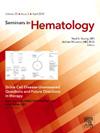Genetic predisposition to myelodysplastic syndrome: Genetic counseling and transplant implications
IF 4.1
3区 医学
Q1 HEMATOLOGY
引用次数: 0
Abstract
The development of myelodysplastic syndromes (MDS) is influenced by various genetic predispositions. Several important genes contribute to disease susceptibility. This paper explores common genetic predisposition genes in MDS, including DDX41, CEBPA, and SAMD9/SAMD9L, which are linked to hereditary conditions presenting diagnostic and clinical challenges. It delves into hereditary conditions that affect platelet production and count, such as RUNX1, ETV6, and ANKRD26, detailing their clinical features and how they contribute to an increased risk of MDS. The discussion extends to additional genetic syndromes like GATA2 deficiency, telomere biology disorders, Fanconi anemia, and Li-Fraumeni syndrome, along with new findings on genes like ERG that offer new insights into disease etiology. The importance of genetic counseling in MDS is underscored, outlining its goals, methods for evaluating family history, risk assessment, and the ethical considerations involved. Furthermore, the role of hematopoietic cell transplantation in managing MDS, particularly in patients with germline syndromes, is reviewed, emphasizing the need for optimal donor selection and personalized treatment approaches. This comprehensive overview illustrates the critical role of genetic factors in MDS and highlights the need for continued research and tailored clinical practices to improve patient outcomes.
骨髓增生异常综合征的遗传倾向:遗传咨询和移植影响。
骨髓增生异常综合征(MDS)的发病受各种遗传倾向的影响。有几个重要基因导致了疾病易感性。本文探讨了 MDS 中常见的遗传易感基因,包括 DDX41、CEBPA 和 SAMD9/SAMD9L,这些基因与遗传性疾病相关,给诊断和临床带来了挑战。报告深入探讨了影响血小板生成和计数的遗传性疾病,如 RUNX1、ETV6 和 ANKRD26,详细介绍了它们的临床特征以及如何导致 MDS 风险增加。讨论还延伸到其他遗传综合征,如 GATA2 缺乏症、端粒生物学紊乱、范可尼贫血症和李-弗劳米尼综合征,以及 ERG 等基因的新发现,这些发现为疾病病因学提供了新的见解。报告强调了遗传咨询在 MDS 中的重要性,概述了遗传咨询的目标、评估家族史的方法、风险评估以及相关的伦理考虑因素。此外,还回顾了造血细胞移植在治疗 MDS(尤其是种系综合征患者)中的作用,强调了最佳供体选择和个性化治疗方法的必要性。这一全面概述说明了遗传因素在 MDS 中的关键作用,并强调了持续研究和有针对性的临床实践以改善患者预后的必要性。
本文章由计算机程序翻译,如有差异,请以英文原文为准。
求助全文
约1分钟内获得全文
求助全文
来源期刊

Seminars in hematology
医学-血液学
CiteScore
6.20
自引率
2.80%
发文量
30
审稿时长
35 days
期刊介绍:
Seminars in Hematology aims to present subjects of current importance in clinical hematology, including related areas of oncology, hematopathology, and blood banking. The journal''s unique issue structure allows for a multi-faceted overview of a single topic via a curated selection of review articles, while also offering a variety of articles that present dynamic and front-line material immediately influencing the field. Seminars in Hematology is devoted to making the important and current work accessible, comprehensible, and valuable to the practicing physician, young investigator, clinical practitioners, and internists/paediatricians with strong interests in blood diseases. Seminars in Hematology publishes original research, reviews, short communications and mini- reviews.
 求助内容:
求助内容: 应助结果提醒方式:
应助结果提醒方式:


